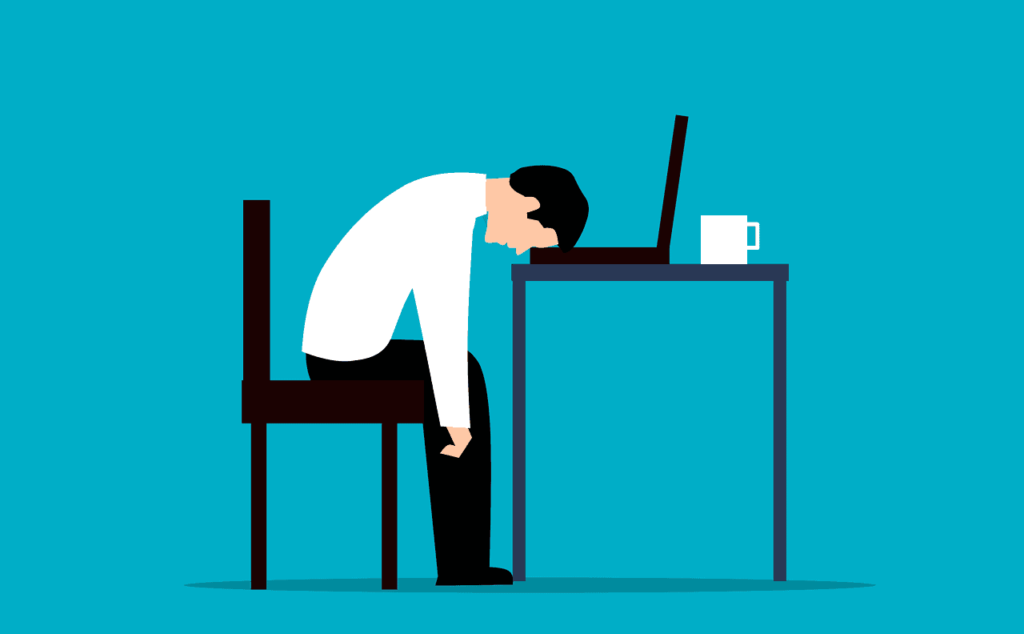Sleep is important for your health. Not getting enough can lead to problems with mood, energy, concentration, and even weight gain.
The struggle is real when it comes to staying awake while studying. We all know that feeling when it’s 3am in the morning, you’re sitting at your desk, and you’re telling yourself “I can’t keep my eyes open.” The dreaded sleepiness sets in.
As a student, it can be hard to make time for sleep. But not sleeping enough can have negative consequences on your grades and motivation level.
Here are some tips you can use to avoid feeling sleepy while studying.
Get enough sleep
The National Sleep Foundation recommends that teenagers and people who are older than 65 get between seven and nine hours of sleep per night. As a freshman, college can be a time when you might be having a hard time getting enough sleep. Try to set aside time to get to sleep at the right times each night, such as getting to bed between 9 and 10.
Getting up for school doesn’t have to feel like an uphill battle. Try to get up 15-minutes earlier than usual and prepare your bed for when you will be lying in it. This will increase the amount of time you spend in bed before you start your daily routine, which helps keep you in a sleep state.
The easiest and fastest way to fall asleep is to get the body clock in your brain to shift to a new time zone. To do this, keep the time on your computer or smartphone the same as your bedroom and go to bed at the same time each night. If you can’t fall asleep, start reading a book until you are sleepy. Your brain has developed to understand that getting enough sleep is important.
Drink plenty of water
Getting enough water helps your body function more efficiently, and having adequate hydration can help you stay awake.
Dehydration is linked with a number of problems including slow reaction time and a reduced ability to learn new information. Drinking enough water can also help you avoid the temptation to reach for a cup of coffee.
Instead, just drink water. If you’re not sure how much water you should be drinking, consider following the Body Mass Index (BMI) to determine your own water consumption.
Staying hydrated is very important in terms of waking you up and keeping you alert. Don’t forget to drink lots of water between classes and at other times of the day.
Consider non-caffeinated drinks
Caffeinated beverages can contribute to drowsiness. If you’re planning on studying or working late at night, consider drinking coffee or tea. Although coffee can lead to drowsiness, it can also help you get more done. And if you’d like to reduce your caffeine intake, try adding chamomile tea or green tea to your diet. Both will help you stay alert.
Eat healthy
If you have trouble staying awake during your studies, try eating regularly. Food doesn’t just fuel our bodies — it fuels our brains as well. Make sure you’re eating nutritious meals that will keep you from feeling sleepy and tired.
Keep your blood sugar stable by eating small meals every couple of hours. Don’t eat large meals right before bedtime, but make sure to eat a snack a few hours before. You should also avoid eating spicy foods right before bed. Spicy foods can give you a spike in blood sugar levels that may keep you awake.
Exercise
Exercise is an important part of maintaining a healthy body. A variety of studies show that regular exercise can improve your brain function and ability to focus. The more exercise you do, the better you can stay awake.
Studies have found that a half-hour-long walk or even a single workout session may be enough to help keep you alert. You can do this by scheduling a workout session at the same time each day that you normally study.
Mood and stress management
Just like exercise, people have shown that managing mood and stress can help them stay awake. People with insomnia sometimes struggle with a lack of energy and motivation to study. And stress-related fatigue is common among students. It’s best to learn how to cope with stress and create time for relaxation.
Take breaks when studying
When studying, it can be tempting to keep going without taking a break. But in order to learn effectively, you need to put your mind somewhere else. Take a few minutes every hour to do something unrelated to your studies. During this time, let your mind relax.
Read a book
Sometimes, you need to change your environment to stay awake. It can be hard to focus on an important topic in a bright room, so use this time to read a book.
There are some that can be found on most library shelves. Choose one that you know well and think about what you can learn from it. It will keep you from thinking about how tired you are and help you concentrate better.
Related Blog: Important Things To Know About College Life
Study in well-lit areas
You’ll want to avoid studying in a dark room. Your eyes will make it hard to stay awake, and the lack of natural light can have a negative impact on your mood. Try reading, working in a brightly lit room, or taking advantage of your natural daylight exposure during the day.
Power naps are good
You can’t just sleep the day away when you’re studying. To make sure you’re getting the proper amount of rest, take a quick nap around lunchtime and study for a short time before going back to sleep.
After studying for about 30 minutes, take another nap until about 3 p.m. and study for about 30 more minutes before heading back to sleep. You can take a third nap if you’re studying right before going to bed at night.
Nap for 15 minutes
If you have a hard time staying awake for long periods of time, this might be your solution. There’s no need to sit at your desk for hours on end. Get up and walk around the room. Stroll slowly back and forth in your seat. Make your mental and physical activities as varied as possible. Staying active might allow you to stay alert longer than you think. Take short naps every hour or two. Set a realistic goal. You should get about 15 minutes of sleep during every long break. If you can make that happen for four hours, great. If it’s easier to accomplish that in one or two hours, go for it. You can always get more sleep at night.
Take shorter study sessions
Studying for longer than you have time for is a sure-fire way to get sleepy. Studying intensely for 15 minutes can leave you fatigued. On the other hand, a two-hour cram session might leave you so sleep-deprived that you fall asleep mid-sentence.
Studying for only an hour at a time gives your mind a chance to rest. You can read and listen to audio books or listen to podcasts. Anything that doesn’t require too much thinking. Also, make sure you take a short break every 30 minutes or so, even if you just have a glass of water.
Stay active
One easy way to stay awake and alert is to stay active. Sitting or lying down for long periods of time is not good for your health. Exercise can be a fun and effective way to stay alert while you study.
You could even do a quick 15-minute walk around campus or a quick walk to get a cup of coffee. Some students have found that exercising can keep them awake, but others feel it is just too hard to be active all the time. A good way to deal with this problem is to only exercise when you’re really tired. Make sure you walk slowly, take breaks, and drink plenty of water.
Listening to music while studying can keep you from feeling sleepy. Listening to music while you work on a task can increase your focus and attention to detail. Music can also be a very pleasant distraction.
Remember why you’re studying
It’s important to create a habit of studying and getting your work done early. It’s hard to concentrate when you feel tired. You need to be doing something that feels meaningful, whether that’s doing a makeup assignment, getting caught up on reading the latest literature for an assignment, or going through a puzzle that has been sitting untouched for a while.
Be organized
Organization makes your life easier, and your brain is much more alert when it’s clear what you have to do. Set up a planner or a journal where you keep track of assignments. Make a list of the books you want to read for class, or jot down the lesson plans that you need to make before you can study. The more organized you are, the less fatigue you’ll experience.
Set a timer
Studies have shown that using a timer can reduce energy expenditure. It helps you keep track of how much time you are spending on study tasks and when you need to head to bed. You can set a timer on your phone or by going into the app on your computer. Try to avoid using your computer as a study tool because it uses a lot of energy to be on.
How to stay awake
If you know that you tend to fall asleep during your study sessions, you’re not alone. The National Sleep Foundation explains that individuals who have very regular sleep patterns fall asleep about seven to nine hours after going to bed.
Some students and working adults make use of light boxes or pillows that cause the body to perceive light, which is beneficial for those who are sleep deprived. However, many students find it hard to maintain a regular sleep schedule and keep up a regular sleep schedule.
It’s not a coincidence that many adults who struggle with getting enough sleep also suffer from lower grades. But, while we may need more sleep than others, it’s usually more effective to follow your natural sleep schedule.
Take care of your eyes
If you have trouble keeping your eyes open, you should give your eyes a break. You can also protect your eyes with eyewear. Make sure you have sunglasses that can block bright lights when it is needed and that you take care of your glasses. It is also recommended to wear a scarf or cap if it is chilly. If you have a pair of glasses, you should clean them regularly.
Get the right gear for studying
There are some things you can do to make studying more efficient. At the top of the list is having the right gear at your disposal to aid your efforts.
For example, you can invest in a wireless keyboard, a headset, or a screen that you can place under your monitor. In addition to the above, you need to wear the right clothing, eat the right food, and drink plenty of water. None of this will be of any use if you don’t feel rested while you do it.
Why sleepiness happens
Lack of sleep can cause a number of physical issues, including lethargy, headaches, constipation, and even cancer. In addition, lack of sleep can make it difficult to concentrate on the material you’re studying. Research shows that students who fall asleep during class tend to learn fewer facts than students who stay awake.
How to avoid sleepiness
Aim to get at least 8 hours of sleep a night, and aim to avoid staying awake in class. You can use these tips to stay awake without becoming drowsy
Other ways to avoid feeling sleepy
The good news is that it’s easier than ever to work around your sleep problems. By using some simple strategies, you can keep yourself awake while studying and even come up with ways to maximize your sleep time.
Make Sure Your Home is Quiet
Try to work while being as quiet as possible. Not only will it keep you awake longer, it will also increase your focus. All you need to do is turn off the fan in the room and make sure the noise from your roommate’s voice doesn’t disturb you. Do not schedule interviews and deadlines on the same day and evening because you’ll have to choose between staying awake to study or getting enough sleep to make it through the day.
Develop a routine for studying
Pick out a time to study every day and stick to it. When you set a routine, your body has a built-in mechanism to hold you accountable. You won’t have time to give up on studying because you have a certain time to dedicate to it. Try working ahead a bit at the beginning of the week and allow yourself some extra time before the actual assignment. After that, study on your schedule. For example, if your schedule looks like this: Wake up at 6:30 a.m., class at 8 a.m., study at 1 p.m., lunch at 12:30 p.m., study at 2:30 p.m., dinner at 5:30 p.m., study from 6:30 p.m. to 10 p.m., then sleep, the cycle will be repeating over and over and over. The best way to combat this habit is to use technology to help you out.
Find the right time to study
It’s easy to feel tired while trying to study. Students tend to stay up late, which can make it hard to concentrate in the early morning hours. Try to get the most out of your school day and avoid putting in late nights before a big exam. Set a schedule and stick to it.
Keep snacks nearby
There’s no need to feel hungry when you’re studying. But food can help boost energy levels and fend off sleepiness. It’s not a good idea to skip meals either, as it can also cause bad moods and irritability. Try keeping a healthy snack or meal near by to combat drowsiness while studying. Healthy snacks are recommended, such as nuts, carrots, apples, watermelon, and even chamomile tea.
Keep the bedroom cool
Bedding temperature and the humidity in the room can affect sleep.
Related Blog: How to Get Rid of Overthinking When Studying
Conclusion
Staying awake while studying is possible. Just remember to focus on your goals and find the right time and place to study.





